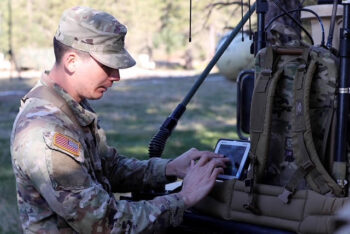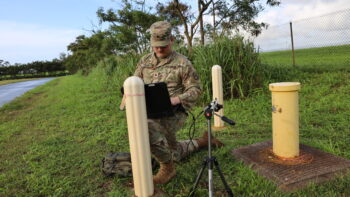
WASHINGTON: Third time’s (hopefully) the charm for the Trump Administration when it comes to candidates for Army Secretary. After the withdrawals of Vincent Viola, a billionaire with no government experience, and Mark Green, a Tennessee politician with a controversial track record, Trump has picked an experienced Washington insider, Mark Esper.

Mark Esper
Esper probably is unlikely to rock any boats at the Army Department, instead serving as the soft-spoken civilian wingman to the wisecracking Chief of Staff, Gen. Mark Milley. Esper’s whole career has been about quiet, low-key performance, not controversy. But that makes him much more likely to survive the Senate than Trump’s previous candidates.
It’s also in keeping with what we hear from one well placed source is Defense Secretary Jim Mattis’ preference for civilians without their own constituencies and policy goals. Mattis wants to run his department and run it his way — which President Trump, so far, appears to be willing to let him do.
All three prospective Army secretaries graduated from West Point and served as Army officers, but there the differences end. Viola embodied Trump’s early preference (since abandoned) for outsiders, preferably billionaires. He also reflected the Trump team’s inexperience vetting candidates. He withdrew — at least officially — because he decided that divesting potential conflicts of interest would prove prohibitively costly and complex. That’s something most administrations would have caught before they announced him. Green was just as much an outsider to Washington, but his political career in Tennessee had given him free rein to criticize gays, transgender people, and the theory of evolution in ways that came back to haunt him — again, all things vetting should have caught.
Esper’s track record, by contrast, seems like it will only help him — despite spending most of career in the Washington “swamp” that the president once promised to drain. After his Army career, in which he served in the 1991 Gulf War and rose to lieutenant colonel, Esper worked as a Pentagon civilian, a Hill staffer, a thinktanker, an executive VP at two trade associations, and, most recently, as a lobbyist for a big defense contractor. It’s hard to imagine a more insider career. He even holds degrees from Harvard’s Kennedy School of Government (a master’s) and from George Washington University in D.C.
Here’s a rundown of Esper’s resume (not in chronological order):
- Defense Industry: Esper has worked seven years at Raytheon, where he’s VP for government relations — i.e. the top lobbyist for the No. 3 defense contractor.
- Trade Associations: At the Aerospace Industries Association, the most powerful defense advocacy group, Esper was executive VP and Chief Operating Officer, with additional responsibilities for defense and international issues. At the U.S. Chamber of Commerce, Esper was executive VP for the Global Intellectual Property Center and VP for Europe and Asia.
- Congress: He worked on national security issues for Sen. Bill Frist, Sen. Chuck Hagel (who later became Secretary of Defense), the House Armed Services Committee, the Senate Foreign Relations Committee, and the Senate Governmental Affairs Committee.
- Thinktanks: He was chief of staff at the Heritage Foundation, the intellectual engine for the right wing of the Republican Party and, most recently, for the Trump campaign.
- Pentagon: Esper served two years as deputy assistant secretary of defense for negotiations policy, working on arms control and non-proliferation.
- Presidential Politics: Esper also worked for Fred Thompson’s short-lived 2008 presidential campaign.
The one wild card in all this: the health of Sen. John McCain, diagnosed with what is normally a lethal brain tumor. If the Senate Armed Services Committee continues to function day to day under Sen. James Inhofe, then Esper’s nomination may be dealt with pretty quickly. If McCain wants to supervise such senior nominations and can return to Washington, the timeline may become much more uncertain.
Colin contributed to this article.
Israel signs $583 million deal to sell Barak air defense to Slovakia
The agreement marks the latest air defense export by Israel to Europe, despite its ongoing war in Gaza.


























